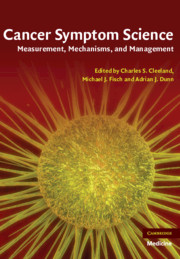Book contents
- Frontmatter
- Contents
- Contributors
- Foreword
- Credits and acknowledgements
- Section 1 Introduction
- Section 2 Cancer Symptom Mechanisms and Models: Clinical and Basic Science
- 4 The clinical science of cancer pain assessment and management
- 5 Pain: basic science
- 5a Mechanisms of disease-related pain in cancer: insights from the study of bone tumors
- 5b The physiology of neuropathic pain
- 6 Cognitive dysfunction: is chemobrain real?
- 7 Cognitive impairment: basic science
- 8 Depression in cancer: pathophysiology at the mind-body interface
- 9 Depressive illness: basic science
- 9a Animal models of depressive illness and sickness behavior
- 9b From inflammation to sickness and depression: the cytokine connection
- 10 Cancer-related fatigue: clinical science
- 11 Developing translational animal models of cancer-related fatigue
- 12 Cancer anorexia/weight loss syndrome: clinical science
- 13 Appetite loss/cachexia: basic science
- 14 Sleep and its disorders: clinical science
- 15 Sleep and its disorders: basic science
- 16 Proteins and symptoms
- 17 Genetic approaches to treating and preventing symptoms in patients with cancer
- 18 Functional imaging of symptoms
- 19 High-dose therapy and posttransplantation symptom burden: striking a balance
- Section 3 Clinical Perspectives In Symptom Management and Research
- Section 4 Symptom Measurement
- Section 5 Government and Industry Perspectives
- Section 6 Conclusion
- Index
- Plate section
- References
6 - Cognitive dysfunction: is chemobrain real?
from Section 2 - Cancer Symptom Mechanisms and Models: Clinical and Basic Science
Published online by Cambridge University Press: 05 August 2011
- Frontmatter
- Contents
- Contributors
- Foreword
- Credits and acknowledgements
- Section 1 Introduction
- Section 2 Cancer Symptom Mechanisms and Models: Clinical and Basic Science
- 4 The clinical science of cancer pain assessment and management
- 5 Pain: basic science
- 5a Mechanisms of disease-related pain in cancer: insights from the study of bone tumors
- 5b The physiology of neuropathic pain
- 6 Cognitive dysfunction: is chemobrain real?
- 7 Cognitive impairment: basic science
- 8 Depression in cancer: pathophysiology at the mind-body interface
- 9 Depressive illness: basic science
- 9a Animal models of depressive illness and sickness behavior
- 9b From inflammation to sickness and depression: the cytokine connection
- 10 Cancer-related fatigue: clinical science
- 11 Developing translational animal models of cancer-related fatigue
- 12 Cancer anorexia/weight loss syndrome: clinical science
- 13 Appetite loss/cachexia: basic science
- 14 Sleep and its disorders: clinical science
- 15 Sleep and its disorders: basic science
- 16 Proteins and symptoms
- 17 Genetic approaches to treating and preventing symptoms in patients with cancer
- 18 Functional imaging of symptoms
- 19 High-dose therapy and posttransplantation symptom burden: striking a balance
- Section 3 Clinical Perspectives In Symptom Management and Research
- Section 4 Symptom Measurement
- Section 5 Government and Industry Perspectives
- Section 6 Conclusion
- Index
- Plate section
- References
Summary
Cognitive dysfunction is ubiquitous in patients with cancer. It can be caused by various factors, including: (1) cancer in the central nervous system (CNS); (2) cancers outside the CNS that have remote effects on brain function; (3) cancer treatment; (4) adjuvant medication(s); and/or (5) neurological disorders unrelated to cancer. Long seen as a problem in the pediatric population, cognitive difficulties related to chemotherapy treatment are becoming recognized as a real phenomenon in adults as well.
Clinical research studies have used various definitions of cognitive impairment and different methodologies for assessment and statistical analysis which contributes to the variability in findings across studies. This chapter discusses both the preclinical and human studies that are advancing our knowledge of the effects of cancer and cancer treatment on brain function.
Chemobrain: a pattern of cognitive dysfunction
Adult patients with cancer who complain of “chemobrain” or “chemofog” typically report cognitive symptoms soon after they begin chemotherapy treatment. The most commonly described cognitive problems include difficulties with memory, attention, information-processing speed, and organization (ie, executive dysfunction). In patients with chemotherapy-related cognitive dysfunction, neuropsychological evaluation frequently uncovers difficulties sustaining focused attention that substantiate patient reports of episodes during which they have “spaced out” and lost their concentration. Deficits in working memory and executive function are also common and may correspond to patient reports of disorganization and difficulty multitasking. Measures of information-processing speed and fine motor function suggest further inefficiencies in cognitive and motor functioning.
- Type
- Chapter
- Information
- Cancer Symptom ScienceMeasurement, Mechanisms, and Management, pp. 51 - 59Publisher: Cambridge University PressPrint publication year: 2010



